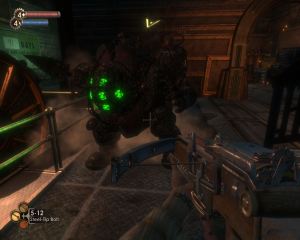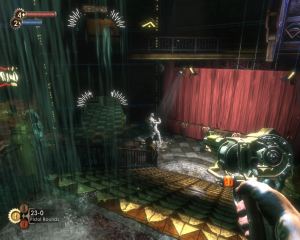This post has not been edited by the GamesBeat staff. Opinions by GamesBeat community writers do not necessarily reflect those of the staff.
A stream of water breaks over an outspread palm, trickles like glass down a metal bulkhead overgrown with ivy, and pools at your feet. The pool swells. It creeps over the floor and then down a small flight of stairs before finally coming to a rest. If it hasn’t occurred to you before now, it certainly does here, in the heart of Arcadia: Rapture is beautiful.
And, despite the melodramatic narrative of Andrew Ryan, Atlas, and Jack that takes place within, it must also occur to you at some point that the main character in Bioshock is not the player character or even Andrew Ryan but Rapture itself.
Rapture is a utopian, underwater palace. But it is also a place where noisy vending machines chatter loudly at passers-by ("Welcome to the Circus of Values!"), and where hospital rooms are filled with carnage that, you can be sure, has been wholly effected by nurses and surgeons. It is a place where you can stare out at a turquoise ocean landscape in one wing, and a blood-red autumnal hell in another.
It was Rapture that players fell in love with a year and a half ago, not the Big Daddies or masked splicers or Plasmid powers, and it was so enthralling that Bioshock became a timeless classic almost overnight. It is a feat not to be underplayed, even if the constituent gameplay elements of Bioshock are not so revolutionary. In fact, little occurs in Bioshock that can’t also be found in System Shock 2, and special powers like lightning and fire, while rich in context, are hardly earth-shattering. Not that there’s anything really wrong with Bioshock’s gameplay, but the gameplay is not what imprinted the game upon the collective minds of millions of players. Rapture did that.

Yet all is not right in Rapture. Its citizens have all become crackheads hooked on the super-powered, DNA-melting, protojelly known as Adam. No sooner do you set foot in this amazing world then a bunch of hooligans set on you like bees on honey. And that’s the end of that. Everything thereafter is simply a different shape of the same theme of senseless violence.
It’s rather disheartening to be in a world, so consistent and so rich, that provides only one means of communication between its characters, namely bullets. To put it another way: this world is steeped in the philosophies of morality to such an extent that its floors are painted with phrases like, “Aesthetics are a moral imperative. " Its speakers blare with Andrew Ryan and Frank Fontaine, who, along with graffiti artists, engage in a dialogue about the role of the individual in society, the role of society in the world, and the role of morality in the world. And the only thing you get to do is shoot at things.
Perhaps the best example of this is when you unlock a character’s heavily chained lockbox, a prize the owner had held so dear he was unwilling to give it to you (he gives you a new power instead). When you do crack the box, eager to discover what the big deal was, all you find inside is ammo, first aid kits, and money.
A microcosm for this problem occurs at the transition into the game’s final act. There you encounter a plot twist so unnerving, so damn perfect, that it literally explains everything that had happened before. Bioshock’s plot twist actually accounts for the cliched video game logic of mindlessly following your mission in a way that neither breaks the fourth wall nor parodies itself. It was genius, and a twist of this type can never be done again.

Then, irony of ironies, you get to the last act of the game, an act filled with every possible video game cliché you could imagine: an extended fetch quest sequence, an escort mission, and a diabolical and thoroughly unrealistic super villain. Bioshock becomes just another video game literally on the heels of it superseding every other video game both narratively and existentially.
It may be a harsh view, but consider what we’re talking about here: thematic dissonance, the nature of morality, and the existential signifiance of being a player character in a static, unchanging adventure. Most game criticisms get stuck in the mud of level design, player control, and gameplay. Most games can’t even get beyond those steps. Bioshock is such a sound experience that it actually provides us the opportunity to talk about things relevant to the human experience, and if it undercuts its message now and then, well, so do some of the best novels. The game is still, at the end of the day, a watershed moment for video game design.
Let’s see where it goes from here.
(Originally posted on GameSnobs.com)
